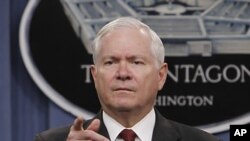U.S. Defense Secretary Robert Gates is defending the new Pentagon media policy he issued last week, requiring all interview requests to be cleared through his public affairs office. The policy has led to concern among reporters that their access to military and civilian officials will be curtailed.
Secretary Gates began a news conference Thursday repeating something he said many times when he first took office three-and-a-half years ago.
"I spent my first few months on the job telling military audiences that the press was not the enemy and that to treat it as such was counterproductive and self-defeating," he said.
Gates said that has not changed. But he says some in his huge department have gone too far in telling reporters things they should not.
He noted that he has had to accept the resignations of two senior officers because of things they told the media, including the U.S. and NATO commander in Afghanistan, General Stanley McChrystal, who resigned two weeks ago. He also revealed that he had to reprimand another senior officer for making a public statement on U.S. foreign policy, but officials will not identify the officer or the issue.
The secretary, who also served in the previous administration, said such things have been noted at the White House.
"I've had two very different presidents, each on several occasions, express concern to me about senior defense officials, both civilian and military, speaking out inappropriately on foreign policy issues," he said. "These instances, together with my own frustration with premature disclosures of personnel, budget and other options under consideration led me to conclude several weeks ago that we need greater coordination and discipline."
At briefings this week and through actions by reporters' organizations, journalists who cover the Pentagon have expressed concern about the new policy, saying it will cause officials to decide not to speak to them rather than risk the secretary's anger or make the effort to go through a formal approval process. Reporters are also concerned about the time it will take to clear requests.
Gates said the goal is not to reduce media access, but he acknowledged he wants greater controls on who in his department speaks to the press, and when, and about what.
"This is more about our being more intelligent and thoughtful about how we respond to requests for interviews and to try and make sure the information you're getting is accurate, as well as making sure that our people aren't speaking out about issues where they may be treading on sensitive ground and not even know it," he said.
At the same time, Secretary Gates said he believes important stories about problems in his department will still be reported. He cited reports of problems in veterans' care and the delivery of armored vehicles in the war zones, and called such stories "tools" that help him get important information and take necessary action.
Some journalists believe reporting such stories will now be more difficult, but others note that past attempts to crack down on information leaks from the Pentagon have had only limited and temporary success. The organization Military Reporters and Editors says it will monitor the policy for 60 days before deciding whether to request any changes.




